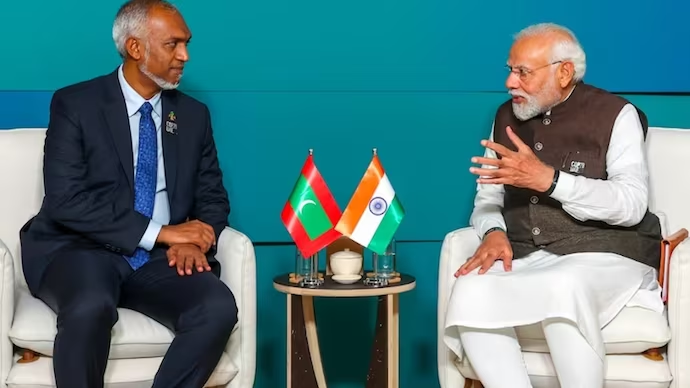Free Courses Sale ends Soon, Get It Now


Free Courses Sale ends Soon, Get It Now



Copyright infringement not intended
Picture Courtesy: https://www.indiatoday.in/india/story/maldives-asks-india-to-withdraw-its-military-presence-from-island-nation-amid-diplomatic-row-2488540-2024-01-14
Context: Maldives signing a defence agreement with China after the withdrawal of Indian troops marks a significant shift in the geopolitical landscape of the Indian Ocean.
Details
Enter China: Filling the Security Vacuum
India's Response: A Diplomatic Tightrope Walk
|
India-Maldives Defence Relations |
|
|
About |
Details |
|
History |
Established in 1978 with a Maritime Boundary Agreement. Strengthened after India's intervention in a coup attempt (Operation Cactus) in 1988. |
|
Nature of Cooperation |
Training: India trains approximately 70% of Maldivian National Defence Force (MNDF) personnel. Joint Exercises: Ekuverin, Dosti, Ekatha (military) and disaster relief exercises. Infrastructure & Equipment: India assisted with defence infrastructure, and radars, and supplied military hardware. Information Sharing: Regular exchange of intelligence and security information. Disaster Relief: India provided aid during the 2004 tsunami and other natural disasters. |
|
Key Benefits for Maldives |
Enhanced MNDF capabilities. Improved maritime security and disaster preparedness. Access to advanced training and equipment. Reliable security partner (historically). |
|
Key Benefits for India |
Strategic influence in the Indian Ocean. Enhanced regional security and stability. The market for defence equipment. |
|
Recent Developments |
The Maldivian President requested the withdrawal of Indian troops. India agreed to complete the withdrawal by May 10, 2024. The Maldives signed a defence agreement with China. |
Conclusion
Must Read Articles:
INDIA MALDIVES RELATIONS: https://www.iasgyan.in/daily-current-affairs/india-maldives-relations-5#:~:text=India%20and%20the%20Maldives%20signed,%2C%20and%20capacity%2Dbuilding%20initiatives.
|
PRACTICE QUESTION Q. China has been rapidly increasing its economic influence in the Maldives through loans and investments. How can India navigate this growing Chinese presence while also ensuring its own security interests in the region, considering the potential for debt-trap diplomacy and increased Chinese military presence? |
© 2024 iasgyan. All right reserved